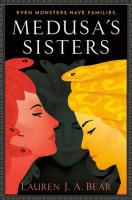
Hello and welcome to #NoWaitWednesdays, where we pick an item off the New Release shelf at one of our library branches that's available for a lucky reader to discover. There are always plenty of gems at the library to find that don't require a two-month wait on the hold lists, and the New Release shelves are always a great place to explore and find your next favorite read.
Medusa is a familiar figure in Greek mythology - a female monster with snakes for hair and a gaze that turns men to stone, usually presented as an antagonist to the hero Perseus, who then cuts off her head to use as a weapon. That's where her story usually ends, but there's plenty of background material that many casual mythology fans might not know: Medusa was one of three sisters - the Gorgons - along with Stheno and Euryale. Their story forms the basis of Lauren J. A. Bear's novel "Medusa's Sisters," which is today's #NoWaitWednesday selection.
When it came out in 2018, Madeline Miller's "Circe" quickly defined a new corner of historical fiction that's still going strong over five years later: An elegantly written novel about a minor figure in world mythology who comes to life when given some attention and a fresh point of view from a talented author. After "Circe" became a hit and a book club favorite (especially for those of us who repeatedly checked out a tattered and well-loved copy of Edith Hamilton's "Mythology" from their middle school library) the market was set for similar retellings, with authors poking around in all corners of myth and legend looking for fresh perspectives. Jennifer Saint, Vaishnavi Patel, and Natalie Haynes all scored high on readers' - and critics' - lists, and now with this sparkling debut from Lauren J. A. Bear, the market isn't going to dry up anytime soon.
"Medusa's Sisters" is narrated by the sisters Stheno and Euryale. While all the sisters are demigods of a sort, these two are immortal, while Medusa is not. Bear flushes out all three as distinct characters who have their own interests, passions, and personalities and who love each other even though they come into conflict with each other, as sisters do: Stheno is the dutiful eldest, trying to watch over the others and be the responsible one. Eurayle, the middle sister, is more given to flashes of jealousy and anger. Medusa, as the youngest - and the only mortal - has an energy and vitality to her that separates her from the rest. She pulls the other two into existing in the human world, to take in its pleasures and delights as well as its troubles and pain. As they explore, they come into the middle of a forbidden love between older, more powerful gods, that curse them into the creatures of myth they come to be known for. Throughout all of the ups and downs, however, their sisterly bond sustains them, and Bear's story presents them as tragic and flawed, but alltogether human. Bear's prose is well-written, poetic, and heavy with the emotion that lurks behind the myth. This will entice readers hungry for Madeline Miller-esque mythology tales as well as casual readers looking for deeper themes. Put this one on your hold list!
